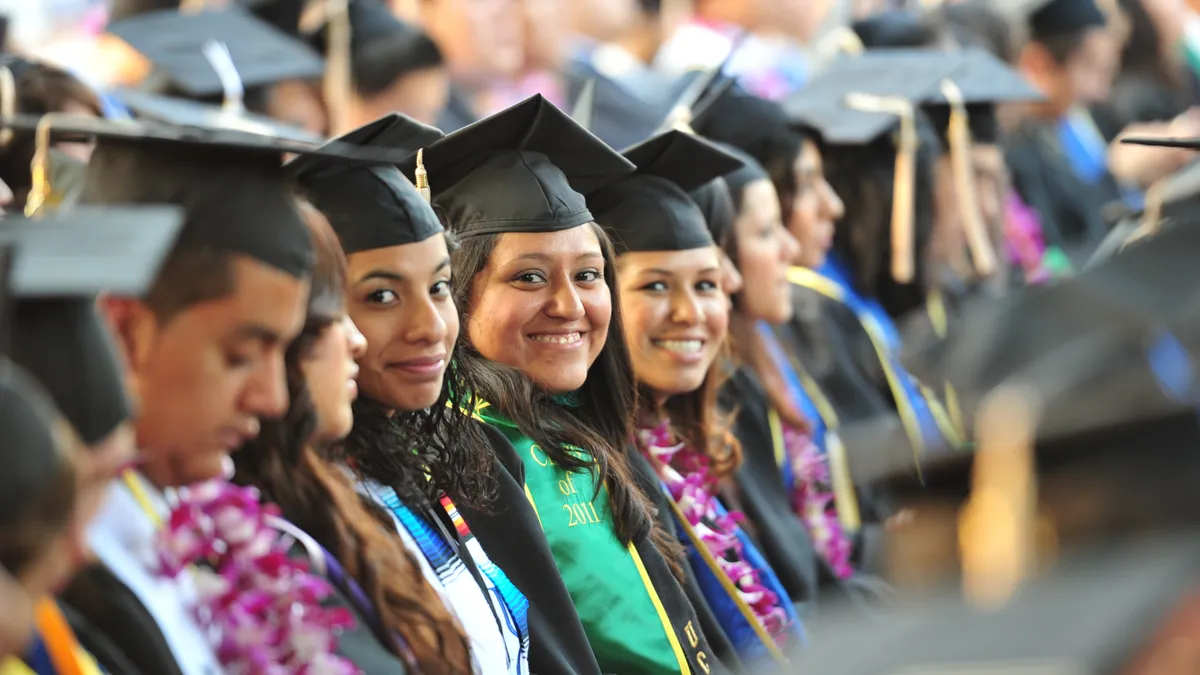Dive Brief:
- Although many teens and young adults say there are payoffs to attending college, slightly more (73%) say on-the-job experience is "a good way prepare for success" in the workforce compared to degrees or other educational experiences, according to a recent survey from The Associated Press-NORC Center for Public Affairs Research.
- Of the 769 teens (ages 13 to 17) and 1,804 young adults (ages 18 to 29) polled, equal shares (60%) said vocational training or a bachelor's degree would help them prepare for success. A slightly higher percentage (66%) said the same of graduate degrees.
- The results also highlight differences in students' college-going habits and their views of higher education based on factors such as family income, race and political leaning.
Dive Insight:
While the teens and young adults responding to AP-NORC's poll said job experience was the most valuable means of preparing for success in the workforce, more than three-fourths said they feel pressure to attend a college or university.
Their responses support a growing body of research that connects a student's family income to whether they enroll in college, where they go and if they graduate.
Sixty-percent of respondents from households earning more than $50,000 per year said they planned to attend a four-year college, compared to 38% of respondents from households earning less than that amount. Meanwhile, of respondents from the latter group, 31% each said they had some or no college plans.
And while 75% of respondents either are or plan to continue their education after high school in some way, 48% are doing so or expect to do so at a four-year college. Around 27% said the same of a two-year or vocational school.
Further, the higher a family's earnings, the more likely those respondents were to say their parents helped with some combination of researching, preparing and paying for college.
Some higher ed researchers speaking with The AP about the findings were concerned that there was too narrow of a gap between respondents saying a bachelor's degree (60%) or a high school diploma (45%) was good prep for success in today's economy. But others were encouraged that students are looking beyond four-year degrees to two-year colleges and vocational programs.
The responses highlight concerns that postsecondary education is not adequately preparing workers for "middle-skills" positions, which require more than a high school diploma but less than a four-year degree.
These jobs account for around one-fourth of so-called "good" jobs, which pay at least $35,000 for younger workers and $45,000 for older workers, according to research from Georgetown University's Center on Education and the Workforce (CEW).
Associate-degree holders saw the biggest gain in "middle-skills" job opportunities in the last three decades, the CEW report notes, though bachelor's degree recipients still command the largest share of "good" jobs. Three in four jobs requiring a bachelor's degree meet CEW's threshold to be called a good job.
In another recent study, more than half (57%) of graduates of nondegree vocational and technical programs said their education was worth the cost. Half of graduate-degree holders and 48% of associate-degree holders said the same, compared to 40% of those with bachelor's degrees.














